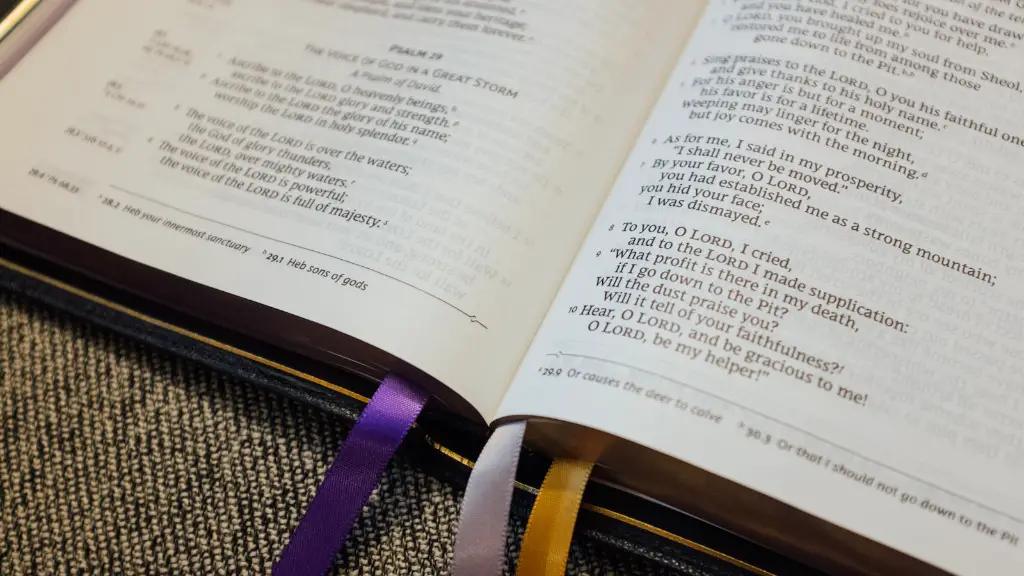Angels appear frequently in the Bible and are an important part of many of its stories. While their appearances are diverse, the Bible often gives them similar, special powers and responsibilities. In many ways, angels fulfill a similar function to demigods, or divine messengers, in some other cultures and religions. However, their biblical depictions are far more varied, and it is important to consider the many different ways in which they appear.
One of the primary roles that angels appear to serve in the Bible is that of protector. Most famously, the angel Gabriel appears to Mary in the New Testament and informs her that she will soon bear the Lord’s son, Jesus. It is also Gabriel who appears to Joseph and tells him not to be afraid to take Mary as his wife, thus saving face for both of them. Other stories in the Bible depict angels working to protect individuals, such as when an angel protects Joseph and Mary when their lives are threatened in Egypt. This role of guardian also appears in the Old Testament, as well.
Angels can also serve as vehicles of divine grief or comfort. In the Old Testament, Moses asks God to forgive the Israelites for their sins, and God promises to spare them, sending his angel to lead them on their way. Likewise, in the New Testament, an angel is sent to comfort Jesus in the Garden of Gethsemane, lifting his spirits to face his crucifixion. Angels also bear witness for the Lord in other ways, appearing to individuals to deliver a message then disappearing into the night.
Angels in the Bible also have a more general role of serving as God’s representatives. For example, in the Book of Joshua, the angel of the Lord appears to Joshua to announce the coming of Israel’s God. This representative function reflects the power of the angels in general and illustrates how they look out for God’s glory and interests.
The power of angels can extend to the physical world as well. In one of the stories of Elijah, the prophet uses his faith to call down angelfire from heaven, burning up his enemies’ chariots. This physical power of angels—which can also result in healing—shows the magnitude of their influence.
Angels also appear in the Bible to act as judges. In the Book of Daniel, an angel appears to the judges to announce the God’s decision that the Israelites are to be spared. Likewise, in the New Testament, Jesus sends an angel to announce the Last Judgment and to gather God’s people together. In these ways, angels appear in the Bible to remind humans of their mortality and the ultimate judgment of God.
Finally, the angels in the Bible are always depicted as luminous, winged beings—the classic image of an angel. This image carries a great deal of spiritual power and presents a lasting impression of the majesty and grandeur of God. It is this image of angels that has captivated the imaginations of many over the centuries.
Angels and Rewards for Faithfulness
Angels reward those who demonstrate faithfulness, even in the midst of adversity. In the New Testament, Jesus sends his angels to reward those who remain faithful even in the face of persecution. An example of this is seen in the parable of Lazarus and the Rich Man, where the poor man who has been obedient to the Lord is rewarded with the angels of God. This reflection of faithfulness is further illustrated by the angel who raises Tobias from the grave, rewarding his faithfulness and obedience.
In some cases, angels are called upon to bring spiritual punishment upon individuals who have disobeyed the Lord. In the Book of Revelation, an angel is sent to punish those who have committed idolatry and to cast them into the lake of fire. These stories demonstrate the serious implications of sin and disobedience, but also that God is just and that faithfulness will ultimately be rewarded.
Angels can also bring a message of for spiritual growth. In the New Testament, the angel Gabriel reminds Joseph of the importance of faith and offers him a message of comfort and hope. Likewise, in the Book of Daniel, an angel speaks to Daniel to exhort him to look to God for guidance and to remain steadfast in his faith. Angels bring warnings of danger and a reminder of the consequences of sin, but also offer a message of hope for those who are willing to remain faithful.
Through the Bible, angels serve as a reminder of God’s presence and power. They appear in a variety of roles, from protectors to judges, and always deliver a powerful message. In all of these instances, angels are presented as shining signs of God’s love, grace and mercy. In this way, they bring to us a reminder of the importance of remaining faithful, even in the midst of dangerous and uncertain times.
Angels and Biblical Knowledge
The Bible offers a tremendous amount of information about angels. This includes their origins, the purposes for which they were made, what roles they fulfill, their capabilities and power dynamics in relation to humans, and the ways in which they interact with humans. All of this information helps us to better understand God’s will and His plans for His creation.
For example, the Bible offers a general statement about the purpose for which angels were made. In the Book of Genesis, it is stated that God created the angels “to serve him.” This implies a certain degree of subordination from the angels, but also that they have a necessary function in relation to God’s will. This is further elucidated in other verses of the Bible, where angels are often referred to as messengers of God and agents of his will.
The roles which angels fulfill in the Bible are often described in great detail. These roles can range from protectors, such as in the story of the angel Gabriel protecting Joseph and Mary in Egypt, to destroyers, as seen in Revelation’s description of the four angels who will cast the wicked into the lake of fire. The Bible also tells us of the capabilities of angels, such as their ability to fly, to traverse long distances quickly, to possess great strength, and to wield supernatural weapons.
The Bible also tells us how angels interact with humanity. For instance, the Bible speaks of angels bringing messages both in dreams and in the form of visions. It also reveals the ways in which humans can interact with angels; in the story of Daniel, the titular character is instructed by an angel to pray and fast in order to receive a blessing from the Lord. This and other similar stories provide us with a clearer understanding of the relationship between angels and humans.
Finally, the Bible offers us a better understanding of the power dynamics within the angelic realm. While angels are subject to God and his will, the Bible also speaks of how some angels have more power than others, as well as how there may be some degree of hierarchy amongst the angels. While much of what is said about angels remains mysterious, the Bible does provide some insight into the power dynamics that exist between angels and humans, and how each is to interact with each another.
Angels – Servants of God or Powerful Religions Force?
Angels have been a source of fascination and debate for many centuries. On the one hand, they are presented in the Bible as powerful celestial beings, messengers of God and agents of his will. On the other hand, they have often been portrayed in popular culture as more human-like figures with a variety of supernatural powers. This has caused some to question whether angels are benevolent servants of the Lord or a spiritual force with the potential to manipulate and control humankind.
At its core, the debate between these two views of angels is rooted in theological interpretations of their roles and powers as presented in the Bible. Generally speaking, those who view angels as servants of God focus on the Biblical references to them serving as messengers and agents of God’s will, emphasizing the importance of their service in the unfolding of divine events. Conversely, those who believe that angels wield great power and can be used to manipulate and control others often cite the warnings in the Bible about the consequences of disobedience or the instances where angels are used to bring spiritual punishment.
It is important to note that the Bible does not provide a definitive answer to the question of how powerful angels are. It does, however, provide some clues as to their roles and functions within Christian theology. Many view angels as spiritual messengers, sent to earth to communicate God’s will and guide humans. Others believe that they possess greater capacities, such as being able to cause spiritual harm or punishment. Ultimately, it is up to individual interpretation to decide what role angels play in one’s faith.
Whatever one’s personal interpretation of the angelic nature may be, it is certain that they maintain a place in popular culture and religion. From their roles in the Bible to their presence in art, literature, and other forms of entertainment, angels have continued to captivate the imaginations of people across the world. As such, it is likely that debate about the power of angels will continue for years to come.
What Role do Angels Play In Our Lives?
Angels are found in many religions around the world, and many believe they play an important role in the lives of humanity. Though each belief system has its own interpretation of how angels act and how their presence affects our lives, there are a few common themes. Generally speaking, angels are believed to be benevolent spiritual beings, protectors and messengers of God.
The idea of angels as protectors is a common one. Many people believe they are sent to protect us from evil, to offer guidance in difficult situations, and to extend God’s grace and mercy to us. In some cases, angels can even act as healers, offering their healing power to those who are suffering. This type of angelic assistance is often seen in cases of physical and emotional healing.
In addition to their role as protectors and healers, angels are often seen as messengers, carrying messages from God to humans. In the Bible, angels are regularly used as messengers from God, appearing to individuals in visions or dreams to deliver warnings or biblical truths. This concept reverberates in modern culture as well; many people believe that angels can send subtle messages about how to live a good and meaningful life.
The role of angels in our lives is ultimately one of divine grace. They are believed to be supernatural beings, sent to offer us protection and guidance in times of need. While some may view them as powerful forces with the ability to manipulate and control humans, the primary message from the Bible is that they are servants of God, sent to remind us of our mortality and to remind us to live faithfully.
Religion is an incredibly personal matter and the role of angels in our lives is no different. Ultimately, what is important is to consider the different ways in which angels are portrayed in the Bible and to make our own interpretation of how they can play a role in our journey of faith.





